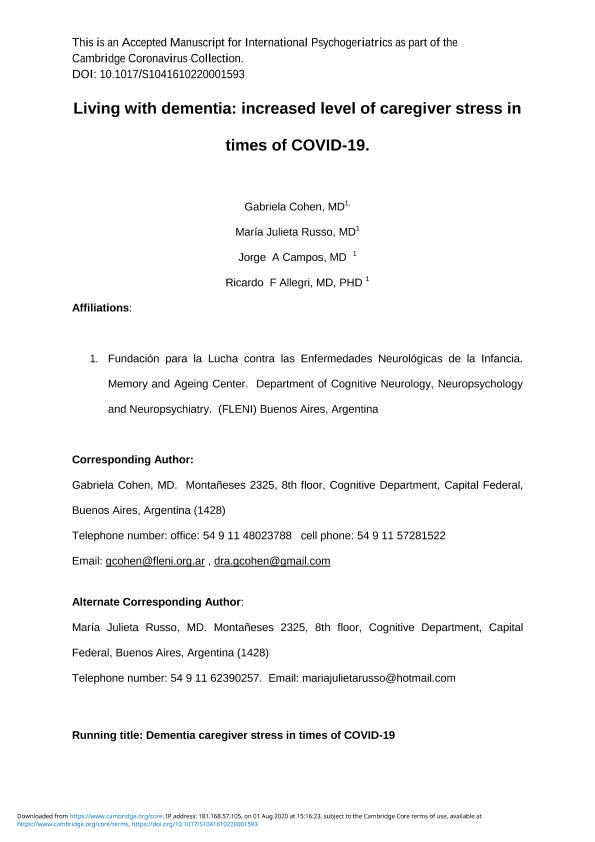Mostrar el registro sencillo del ítem
dc.contributor.author
Cohen, Gabriela
dc.contributor.author
Russo, María Julieta

dc.contributor.author
Campos, Jorge A
dc.contributor.author
Allegri, Ricardo Francisco

dc.date.available
2020-08-25T18:00:02Z
dc.date.issued
2020-07
dc.identifier.citation
Cohen, Gabriela; Russo, María Julieta; Campos, Jorge A; Allegri, Ricardo Francisco; Living with dementia: increased level of caregiver stress in times of COVID-19; Cambridge University Press; International Psychogeriatrics / Ipa.; 2020; 7-2020; 1-11
dc.identifier.issn
1041-6102
dc.identifier.uri
http://hdl.handle.net/11336/112366
dc.description.abstract
COVID-19 pandemic has deeply affected the care that older adults with Alzheimer´s Disease(AD) and related disorders received in Argentina. Even though circulation for familycaregivers of subjects with dementia was one of the few exceptions allowed by thegovernment (Ministerio de la Nación, 2020), we observed that most family members decidedto stop visiting their relatives from fear of spreading the disease.COVID-19 epidemic is causing a radical change in the model of dementia care. Before thispandemic, engaging in social activities, performing cognitive and physical activities, andhaving a productive daily routine has been the mainstay therapy. (Austrom, M. G. et al.,2018). To relief caregiver stress, literature has shown that multicomponent strategies suchas avoiding isolation, attending family and group support meetings, sharing the burden ofcare with other family members were useful (Hughes, T.B. et al., 2014). Now, in times ofCOVID-19, we recommend the most strict social isolation, especially for older patients withdementia and other comorbidities who have the highest risk for severe COVID-19 diseaseand mortality. ( Emami et al., 2020).Previous quarantines in human history had a negative psychological impact on outcomessuch as anger, depression, and loneliness in the general population. (Brooks et al., 2020)but the effects on the wellbeing and standard care of subjects with dementia living in thecommunity is not well studied. The objective of our research was to study to what extendmandatory social isolation affected the stress and burden of care of family members caringfor subjects with dementia after the initial four weeks of quarantine and to study therelationship between the severity of the dementia, measured with the Clinical DementiaRating (CDR) (Hughes, C. et al. 1982) and the impact of the negative effects of quarantinein our setting.
dc.format
application/pdf
dc.language.iso
eng
dc.publisher
Cambridge University Press

dc.rights
info:eu-repo/semantics/openAccess
dc.rights.uri
https://creativecommons.org/licenses/by-nc-sa/2.5/ar/
dc.subject
COVID-19
dc.subject
QUARANTINE
dc.subject
BEHAVIORAL SYMPTOMS
dc.subject
DEMENTIA
dc.subject.classification
Neurología Clínica

dc.subject.classification
Medicina Clínica

dc.subject.classification
CIENCIAS MÉDICAS Y DE LA SALUD

dc.title
Living with dementia: increased level of caregiver stress in times of COVID-19
dc.type
info:eu-repo/semantics/article
dc.type
info:ar-repo/semantics/artículo
dc.type
info:eu-repo/semantics/publishedVersion
dc.date.updated
2020-08-25T15:11:22Z
dc.journal.volume
2020
dc.journal.pagination
1-11
dc.journal.pais
Reino Unido

dc.journal.ciudad
Cambridge
dc.description.fil
Fil: Cohen, Gabriela. Fundación para la Lucha contra las Enfermedades Neurológicas de la Infancia; Argentina
dc.description.fil
Fil: Russo, María Julieta. Fundación para la Lucha contra las Enfermedades Neurológicas de la Infancia; Argentina
dc.description.fil
Fil: Campos, Jorge A. Fundación para la Lucha contra las Enfermedades Neurológicas de la Infancia; Argentina
dc.description.fil
Fil: Allegri, Ricardo Francisco. Fundación para la Lucha contra las Enfermedades Neurológicas de la Infancia; Argentina. Consejo Nacional de Investigaciones Científicas y Técnicas; Argentina
dc.journal.title
International Psychogeriatrics / Ipa.

dc.relation.alternativeid
info:eu-repo/semantics/altIdentifier/url/https://www.cambridge.org/core/product/identifier/S1041610220001593/type/journal_article
dc.relation.alternativeid
info:eu-repo/semantics/altIdentifier/doi/http://dx.doi.org/10.1017/S1041610220001593
Archivos asociados
